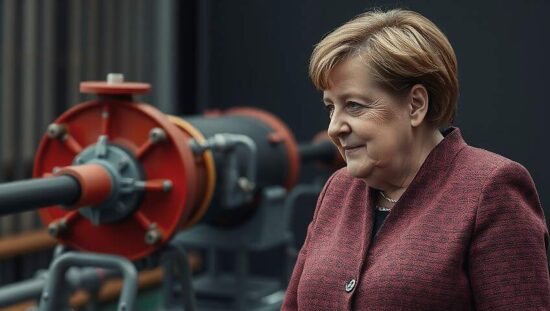In light of new findings regarding Angela Merkel’s Russia policy, opposition politicians are calling for an investigation committee to examine her approval of the sale of German gas storage to the Russian Gazprom conglomerate and her support for the Nord Stream 2 pipeline project. The Green Party’s chairman, Felix Banaszak, told the “Süddeutsche Zeitung” that “without serious parliamentary clarification, the open questions will not be resolved.” He added that his inquiries to the Chancellery and the Finance Ministry were “extremely meager, unsatisfactory and obviously incomplete.”
According to research conducted by the “Süddeutsche Zeitung” despite internal warnings and the previous crisis over the annexation of Crimea, Merkel did not oppose the sale of German gas storage in 2015 to the Russian state-owned company Gazprom. Internal documents from the Chancellery, which the newspaper legally obtained, also show how Merkel actively supported the construction of the Nord Stream 2 pipeline project.
Banaszak stated, “That only through intensive research the engagement of Angela Merkel for Nord Stream 2 becomes clear shows two things. Firstly, some findings about political decisions and thus the responsibility for the greatest energy, economic and foreign policy disaster in the history of the Federal Republic are still sleeping in the well-locked files. Secondly, the responsible parties and their surroundings apparently have neither willingness nor magnanimity to ensure transparency themselves. But without deeper clarification, one takes away from the parliament and also the public the chance to learn from these mistakes for the future.”
Michael Kellner, a former parliamentary state secretary in the Federal Ministry of Economics and Energy, told the SZ that the “threadbare house of cards of the supposedly privatized Nord Stream project” has finally collapsed with the findings from the document review. “Angela Merkel was aware of the risks and deliberately ignored them. With this, she did not fulfill her oath to protect the country from harm.” Kellner believes that the new Chancellor, Friedrich Merz, should begin by actively clarifying the actions of his predecessors in the Chancellery.
The Left Party also sees many unanswered questions. Their economic politician, Jörg Cezanne, told the SZ that “at least from today’s perspective, the transfer of gas storage, which is crucial for supply security, to Gazprom has been proven to be a dramatic mistake.” He called for an urgent and comprehensive clarification of the security and energy policy misjudgments that led to the previous decisions.
According to the documents from the Chancellery, Merkel was informed in writing on September 2, 2015, about a planned asset swap as part of the proposed gas pipeline Nord Stream 2. According to the documents, Gazprom was supposed to receive a stake in the German gas trade, while the BASF subsidiary Wintershall was to receive stakes in gas fields in West Siberia. The Chancellery responded that there was no legal basis to block the deal, although it warned internally of the dangers: “Through control of important gas storage (filling, functionality), Gazprom will be directly responsible for supply security.” However, the sale was still completed.





